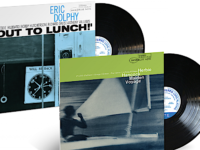Miles Davis’ live 1964 keepsake ‘Four’ And More made a lasting impression on the accomplished trumpeter/keyboardist, composer and bandleader Nicholas Payton. So much so, Payton had long pursued getting that album’s bass player Ron Carter to play on a Payton record. That chance finally came, and Payton quickly arranged recording with Carter, drummer Karriem Riggins and — for a couple of tracks — another ‘Four’ And More alum, the storied saxophonist George Coleman.
Smoke Sessions is what came out of this golden opportunity. It’s a loosely recorded affair that seems to be recorded all live in the studio, much the way Coleman and Carter were recording when they first got started. Payton brings in mostly his originals, some new, some not, and all are played by this multi-generational band in a way that manages to clarify how the older generation of Carter and Coleman informed the jazz of the newer ones.
Payton’s mastery of both the trumpet and piano give him the flexibility to switch to whatever tool works best for a song or even a part of a song. He leverages it by nimbly changing his roles as the music calls for it, as when pivoting from electric piano accompaniment to trumpet trading ideas with Coleman on “Turn-a-Ron,” or when he goes from piano-only to trumpet and Rhodes (one hand for each!) just to provide a couple of numerous examples.
A tight, bossa-nova foundation from Riggins and Carter allows Payton to cook first on Rhodes and then the brass horn on “Levin’s Lope.” New and old come together on “Hangin’ and a Jivin’,” as Riggins’ fresh funk construction finds a perfect fit in Carter’s old school bass figures. Then again, Carter was present when Us3 married hip-hop to jazz on Hand on the Torch; contemporary trends have never been a problem for him.
“Lullaby for a Lamppost (for Danny Barker)” is served up two ways; the first, a dirge-like ballad in a piano trio setting and the second, a joyful stomp with Payton swapping the piano for a dirty sounding electric keyboard. The whole approach is intentionally befitting one of a New Orleans-style funeral march.
George Coleman makes his two appearances count. His big, soul-oozing tenor voice is perfectly mated to Payton’s smooth groover “Big George,” and Payton is content to comp on piano and let the old vet show all the gas he still has left in his tank. “Turn-a-Ron” was imagined by Payton as a vehicle for bringing to focus Carter’s and Coleman’s game-changing ways of handling alternate chord changes and progressions, and the song really becomes an interaction between these two influential legends from the 60s having another go at it and proving how relevant they remain.
Payton makes some very discerning choices for his pair of covers. Herbie Hancock’s Speak Like A Child nugget “Toys” as originally recorded was marked by Carter’s rapt attention to the modern chord changes of the composition, one of the very things that attracted Payton to the iconic bassist. On this contemporary reading, Payton replaces Hancock’s stately horn arrangement with a frayed electric piano bleating out an esoteric succession of chords that Carter quickly figures out before switching to the familiar melody on piano. Even in this one-on-one encounter, Carter can recreate his magic of 1968 as Payton keeps switching to other instruments (even playing trumpet and Rhodes at the same time) and puts trust in Carter keeping things from straying.
“No Lonely Nights,” one of Keith Jarrett’s pretty ballads, becomes a showcase for Payton’s sensitive piano approach in a trio setting, knowing how many notes and no more will do the trick. Even when the band kicks it into a jaunty swing, and his luscious trumpet eases the tune back into a pillowy-soft landing.
Through Nicholas Payton’s long and varied recording career, he’s come up with a number of standouts. Smoke Sessions is one of his standouts because in paying homage to some of his idols, Payton does so in an offhand manner that reveals his own inimitable musical personality. It’s the rare tribute of sorts that adds to the jazz canon, not existing to create redundancy.
Smoke Sessions is available at all the usual outlets, from Smoke Sessions Records.



